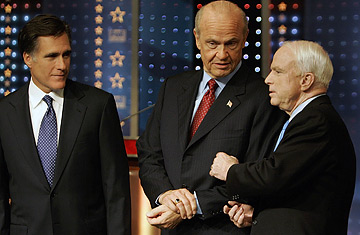
Republican presidential hopefuls, from left, Mitt Romney, Fred Thompson, Sen. John McCain, R-Ariz., talk before a Republican presidential debate in Orlando, Fla., Sunday, Oct. 21, 2007.
Think of Wednesday night's Republican presidential candidate debate in St. Petersburg, Florida as two events in one.
On one level, it should be a rollicking, history-making evening, in which the party's leading contenders for the first time ever answer video questions submitted by users of the trail-blazing website YouTube. The debate was originally supposed to have been held months ago, but had to be rescheduled after several campaigns balked at participating because of reservations about the novel format.
The campaigns finally decided to show up after Florida Republicans and party strategists voiced their concern about the perception that the candidates were dissing the conservative "netroots" activists who have encouraged their side's leaders to embrace the Internet's technology and ethos. How the candidates handle both the format and the interactions with "real" people will be closely watched.
But the more important dimension of the contest will be how the candidates stack up head to head in a fiercely competitive race that has changed dramatically since the last time the G.O.P. hopefuls gathered together on stage.
The party's two front-runners — former New York City mayor Rudy Giuliani and former Massachusetts governor Mitt Romney — have begun the kind of day-to-day and hour-to-hour negative campaigning that could well decide who wins the nomination. Former Arkansas governor Mike Huckabee has surged up in the polls, especially in Iowa, turning a four-man race into an even broader contest. Former Tennessee Senator Fred Thompson has unveiled several big policy proposals, while sliding in some polls. Texas Congressman Ron Paul has become a true force in terms of online fund-raising, and has begun to spend his cash on advertising in key early-voting states. And the once-upon-a-time favorite for the nomination, Arizona Senator John McCain, seems to have put together a plausible — if long-shot — strategy for getting back in the game.
Despite the initial reluctance to play in the YouTube sandbox, the campaigns all claim to be looking forward to Wednesday's distinctive format, in which about 40 video questions will be tossed their way, all pre-selected by CNN, which will air the forum from 8 p.m. to 10 p.m. ET. Some of those who submitted questions will be sitting in the studio audience and will be allowed to ask follow up queries, adding a flesh-and-blood town-hall challenge to the candidates as well. When the Democrats participated in their YouTube session four months ago, it produced one of the most lively and illuminating debates so far.
The Republican candidate who was most openly opposed to joining in the YouTube format was Romney, who denigrated the notion of taking questions from an animated snowman (on global warming, naturally), as the Democrats did. But now Matt Rhoades, Romney's communications director and a man with a talent for euphemism, calls the forum an "opportunity" and says "we expect some colorful questions but also expect a substantive debate."
Katie Levinson, Giuliani's spokeswoman, says, "Rudy is looking forward to the debate... Hopefully, they'll leave the talking snowman at home this time!" And braced for anything, Thompson's adviser Karen Hanretty says, "We don't know what to expect." Still, all the campaigns want to be known as hip, web-savvy, fearless and pro-Florida, making saying "yes" an easy choice once a new date could be agreed to.
If the candidates are willing and ready, whether they are able to answer the questions in a winning way will likely depend to a large extent on what CNN chooses to confront them with. The network's producers are well aware that part of the campaigns' original reluctance to participate was based on long-standing Republican suspicions about CNN's alleged liberal bias. CNN has promised that the questions will be appropriate for a modern Republican nominating process — although that surely means that the tone and substance of many of the chosen submissions (among the several thousands offered up for consideration) will be a bit more lively and challenging than what journalists and debate moderators typically ask.
So watch to see what CNN chooses, and how the candidates handle a format that is certainly not their first choice. But most of all, watch for the engagement between a group of candidates who are a lot more focused on each other and the voting in Iowa and New Hampshire, just over a month away, than they are on talking snowmen and debate formats.
Material from the Associated Press was included in this report
